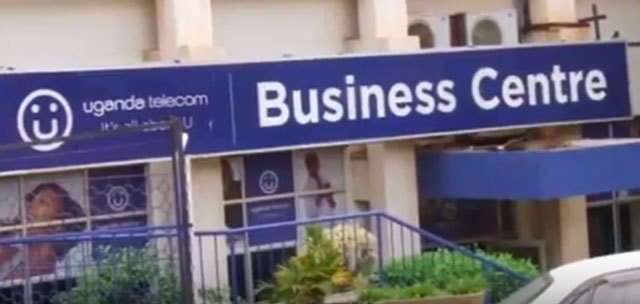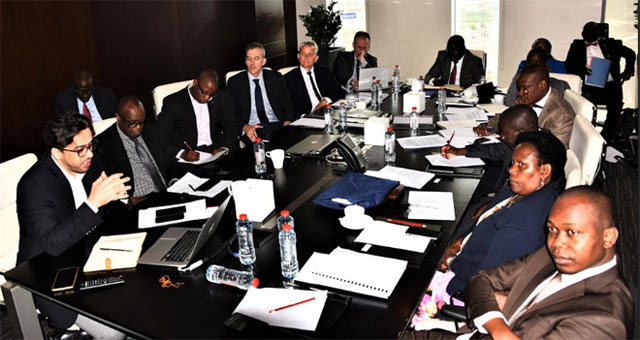
Uganda Telecom Limited (UTL) that has been limping for years, will be rescued by government. Government will take over UTL’s full management immediately.
Minister for Finance Matia Kasaija confirmed Wednesday that Libyan company UCOM, a subsidiary of majority shareholders Libyan Post, Telecommunication and Information Technology Holding Company (LPTIC), would no longer be able to finance UTL.
UCOM, minister Kasaija confirmed, have also directed the resignation of five of its directors from the heavily indebted UTL.
“UTL’s performance since 2007 has been characterized by heavy indebtedness, decline in market share and losses. This was due to inadequate investment, competitive pressure, a dilapidated network and governance challenges,” Kasaija explained.
Government of Uganda takes over the management of #UTL pic.twitter.com/s08fKRWA0X
— Crane Associated Adv (@AdvCrane) March 1, 2017
“From 2011, UCOM was unable to downstream capital to the company owing to the political turmoil in Libya and the UN/EU sanctions on Libya that affected the majority shareholder and froze its assets.”
The minister said UTL is of strategic importance as a provider of telecom services to government, employs over 500 Ugandans directly and paid over sh200 billion in taxes between 2006-2017. Tha is why government decided to intervene to save it and will engage UCOM to ensure an orderly transition.
“UTL customers, stakeholders and the general public should be rest assured that the company will remain operational with the full support of of government” Kasaija said.
Nandala Mafabi
Uganda Telecom Limited’s financial troubles came to the limelight when Nandala Mafabi, (FDC, Budadiri West) tabled a petition in Parliament in November 2016.
In the petition, Mafabi accused management at UTL of asset stripping, insider trading and failure to manage a skyrocketing debt eating into the company’s coffers. He queried why UTL did not heed advice to carry out a forensic audit by the Auditor General’s Office, since any company in which government has an interest in terms of shares must be subjected to the audits.
The petition prompted the Speaker of Parliament Rebecca Kadaga, to constitute a seven-member Select Committee to probe the management and operations of UTL and to also investigate the state of health of UTL; to determine its economic value and also advise on whether government should continue holding shares in the company.
The Brief Statement I tabled before @Parliament_UG on the mismanagement of Uganda Telecom. Credit: @pwatchug pic.twitter.com/JtXm0EU4Sp
— Nandala Mafabi (@NandalaMafabi) November 17, 2016
The Select Committee was also to inquire whether UTL is complying with both national and international laws and requirements for communication, and whether the company is complying with NSSF requirements.
Appearing before the Select Committee in December, Uganda Communications Commission executive director Eng. Godffrey Mutaabazi said UTL’s license needed to have been revoked earlier. He said UTL was operating outside the law and should have been closed.
The UTL management soon after dismissed most of Mafabi’s accusations.
The @UgandaTelecom mgt & board about to issue a statement on the “Nandala report” on the mismanagement of the telecom. pic.twitter.com/8ZxRlpT0RH
— Mark Keith Muhumuza (@mumakeith) November 18, 2016
Committee probes UTL in Dubai
Just last week, the Parliament Select Committee returned from meeting the UTL shareholders in Dubai, at which they were assured all would be well – soon.
The Chairman of Libyan Post, Telecommunication and Information Technology Holding Company (LPTIC) Dr. Faisel Gergab reassured parliament that Uganda Telecom Limited (UTL) still has a future.
Gergab promised the parliamentarians in Dubai that the company will come up with a transformation plan to boost the company’s existing services.
“I am confident that UTL still has significant potential and a great opportunity within the world to provide high quality services,” Dr. Gergab told the Select Committee on UTL at the Dubai International Financial Centre (DIFC).

At the meeting, Steven Kaboyo, the chairperson of UTL Board, blamed many of the problems the company is facing on the minority shareholder (Uganda government). He blamed government for the bureaucracy in decision making, and also the failure to pay over sh16 billion owed by government entities.
“UTL demands lot of money in terms of services offered to government entities. We are now working with the Secretary to Treasury to start deducting this money at source and we shall also disconnect those who haven’t paid just like we have done to Uganda Police,” Kaboyo said.
The UTL committee is chaired by Okin Ojara (Independent MP Chua West). Others on the Select Committee are Michael Tusiime (NRM, Mbarara Munic.), William Nzoghu (FDC, Busongora North), Thomas Tayebwa (NRM, Ruhinda North), Paul Akamba (Ind., Busiki), Lillian Nakate (NRM, Luwero district) and Paula Turyahikayo (NRM, Rubabo).
Gergab had met President Yoweri Museveni in December last year in one of several efforts to save the company after Mafabi’s revelations emerged.
“Our talks with HE President Museveni were very fruitful and positive,” LPTIC Chairman Gergab said in December. “We see an exciting future for UTL as it begins the transformation from legacy old-style PTT to a modern ICT company that will offer high quality and competitive services.”
“As part of a bold transformation plan, UTL will be upgrading its technology in the next year, adding 4G capabilities to provide a wide range of high-quality, high-speed data services to both mobile and fixed customers,” Dr. Gergab said then.
Who owns UTL?
Despite recent challenges, UTL continues to provide vital services across the spectrum for consumers, small and medium sized enterprises (SMEs) and large corporate enterprises.
Established in 1988, UTL is one of the longest-running telecom operators in Uganda. LPTIC via its subsidiary LAP-Green holds 69% majority shareholding in UTL whilst the Ugandan Government holds a minority 31% shareholding in the company.
****
editor@independent.co.ug
 The Independent Uganda: You get the Truth we Pay the Price
The Independent Uganda: You get the Truth we Pay the Price



